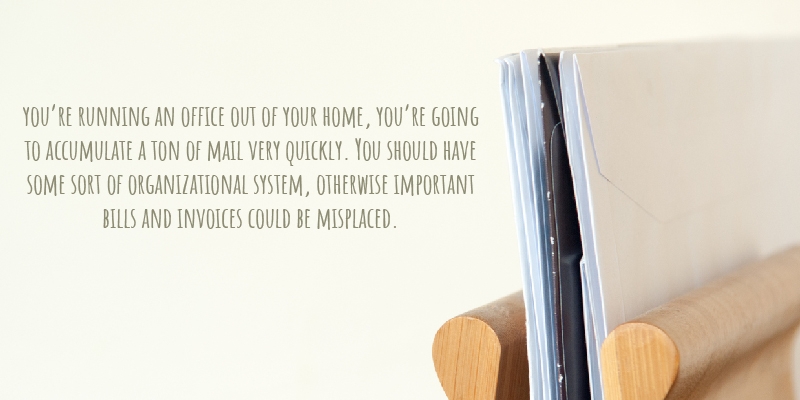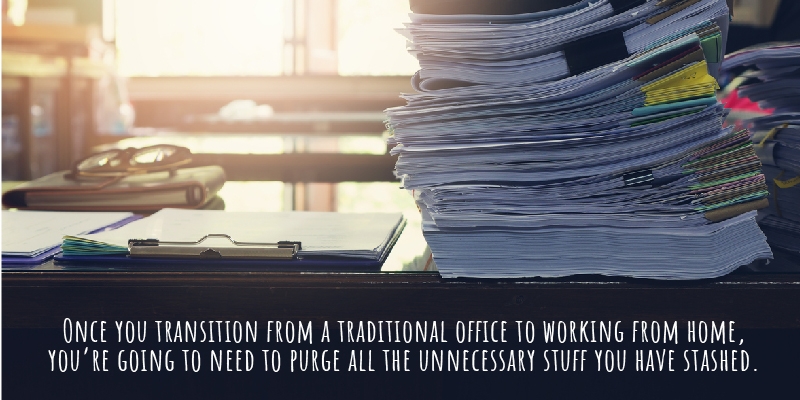Working from Home the Pixie Way
There are a number of benefits to working from home. Not having to commute daily to and from the office can save you time and money. Plus if you want to work in sweats or pajamas, who is going to judge you? But it is not without its challenges. How do you avoid being distracted? How do you maintain a daily routine? How do you keep your space organized? Let’s review how you can work from home- the Pixie Way!
A Home Office Still Needs a Mailroom

Our initial instinct when putting together a home office is to recreate the space we had when we worked in a traditional office setting. This is great for some, and a disaster for others. (There’s a reason you’re working from home, remember!) However, there are two staples (pun intended) of every traditional office that you should implement in your home. The first being a mailroom! If you’re running an office out of your home, you’re going to accumulate a ton of mail very quickly. You should have some sort of organizational system, otherwise important bills and invoices could be misplaced. Select bins or cubbies for different types of mail. Bills, contracts, invoices, and tax information should all have their own homes.
So what do you do with all the mail once it’s been opened? That’s where the second staple comes in. You will need to implement some sort of filing system. The filing system you choose will depend largely on your Pixie Type. Classic Freedoms, Fun Freedoms, and Organics remember files more easily when they use nonspecific labels reflecting how they think or feel about the file (e.g., “Tax Stuff 2017,” not “Federal Tax Form 1040-2017”). One of our Fun Freedom clients had a file that held all the parking tickets she’d fought and won, named “The Man” instead of “Parking Tickets.” She knew exactly what was in that file even though the label wasn’t specific or logical.
Having trouble keeping track of necessary receipts? Use a gallon-size Ziploc bag marked “Receipts 2018.” It’s easy to stuff receipts from a wallet in there, and it takes awhile to fill up. You don’t have to worry about water damage either!
Purge

Once you transition from a traditional office to working from home, you’re going to need to purge all the unnecessary stuff you have stashed. Remember: you only have to keep documents that you might need again one day. Tax receipts and returns generally don’t have to go back further than seven years. Bills and statements don’t need to hang around for more than twelve months. Instead, keep your end-of-year statements. If you fear the federal Tax Man- as you should, to be honest- then once the tax year is done, store those receipts and tax preparation stuff in a deep storage area like the attic or the basement. It doesn’t need to be in your active home office, especially if you’re short on space.
Don’t forget to invest in a good paper shredder and waste basket as you start your initial purge!
Tips for Working from Home

Set Boundaries and Create a Daily Work Schedule. When you work from home it is easy to be sucked into being available to work any time, any day. If you are working for a single company, try to set well-defined work hours to avoid phone calls and emails that might interrupt your personal time. In order to work from home successfully, you have to be well-organized, and have great time management skills. Not every Pixie Type is hardwired that way, so be honest with yourself about your strengths and weaknesses.
Be an Extrovert. Working remotely can prevent you from building workplace relationships that are common in a traditional office setting. When you work from home, you don’t have coworkers you see daily, so meeting new people becomes difficult. You have to be intentional to get out of the house, and try to schedule a fair number of out-of-the-office lunches or coffee meetings with your colleagues and bosses. At the very least, every so often, make a phone call instead of shooting off an email or a text. This can feel like a bit of a time suck, but it can help build camaraderie and connection with your co-workers.
Network Electronically. It’s time to get active in LinkedIn and Facebook groups that relate to your work, employer, alma mater, past employers, or other interests that you follow. Comment on posts from others and add your own two cents. Always be kind, respectful, and as helpful as possible. It displays your expertise and gives you a virtual feeling of being connected to a community. Plus, it’s a unique way to make new connections with people all over the country and world that might be surprisingly beneficial someday.
